Читать книгу Beat the Crowd - Kenneth Fisher - Страница 13
На сайте Литреса книга снята с продажи.
CHAPTER 1
Your Brain-Training Guide
The Right Frame of Mind
ОглавлениеContrarians are patient – they think long-term. Short-term thinking makes you antsy, and that’s when bad decisions happen.
You see it all the time when folks chase heat, piling into whatever is hottest purely because it is up the most. They might get bored with broad diversification during a rally and try to concentrate in a hot trend – they ditch long-term thinking for short. Think back to 1999 and 2000. Internet stocks flew high. Fiber optics was the Next Big Thing. The Nasdaq soared, and everyone wanted a piece of the new economy. Dot-coms seemed like the ultimate get-rich-quick magic.
It’s an extremely short-term mindset, but it viraled. Few thought about where they needed to be in 10 or 20 years (of course, we’re there now). Few looked a year ahead and considered whether companies with ultrahigh cash-burn rates and no revenues could still possibly be in business. They just wanted what was hot then, and they wanted as much as they could get. The bear market beginning in March 2000 was a rude awakening.
Panic-stricken people think short-term, too. Go back to March 2009, those violent final throes of that financial panic. People truly believed stocks could go to zero. Don’t believe me? Do a Google search on “Can the stock market go to zero?” They asked it. Markets were tanking; zeroness felt real.
You’re probably sitting there thinking, “That’s not rational.” But panic never is! Folks take those big losses and extrapolate them forward. They lose their grasp of history and reality. They forget the simple truths: Cycles always turn. Markets rise more often than not. As long as capitalism exists, businesses will find ways to profit and grow. New technologies will collide, bringing new growth and new sources of profits. This is what the steel-nerved contrarians believed in March 2009.
Steely contrarians also look past short-term market movement. They know daily drops, quick pullbacks and corrections are normal during bull markets, and reacting is dangerous. It usually means selling after stocks have already fallen, just when folks should hunker down and wait. Reacting to volatility is a good way to sell low, buy high.
The same goes for seemingly big short-term events, like geopolitical earthquakes. Skirmishes, minor wars, revolutions and saber-rattling have plagued us since the dawn of civilization – terrible as they are for lives and property of those in the line of fire, they usually aren’t terrible (or even just plain bad) for stocks. Markets have dealt with conflict since before the first Dutch tulip changed hands, and only big, global and nasty conflicts, like the onset of World War II, have ever ended in bull markets. Life always goes on, and the going on is what matters.
